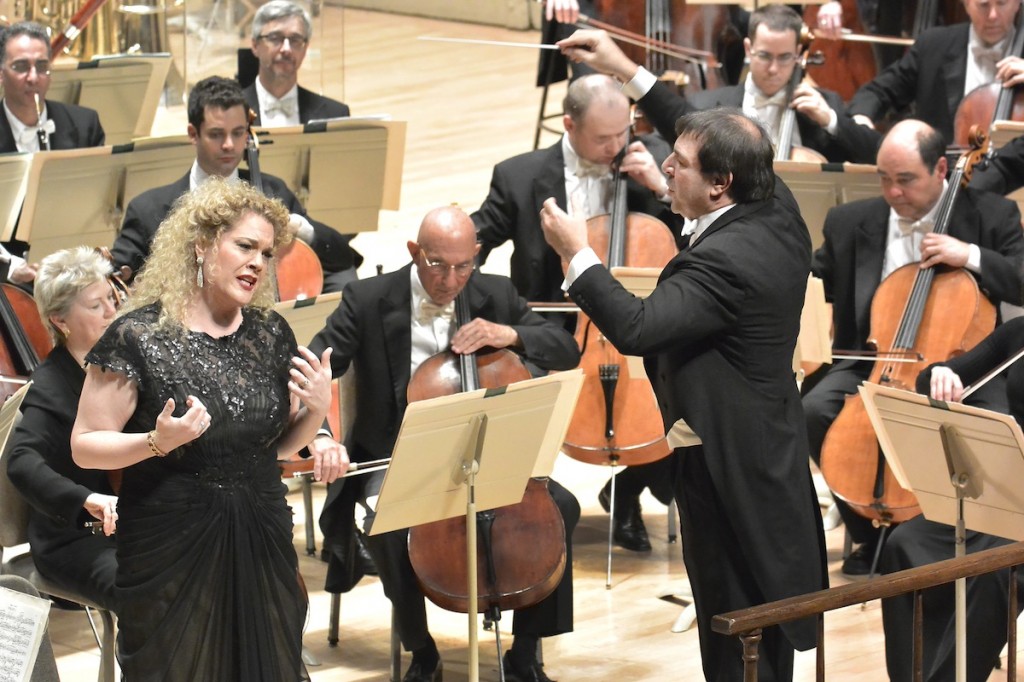Gatti brings his Wagnerian insight to BSO

Soloist Michelle DeYoung, Daniele Gatti and the BSO perform a Wagner program Thursday night at Symphony Hall. Photo: Stu Rosner
Daniele Gatti led the Boston Symphony Orchestra through a celebration of the bicentennial of Richard Wagner’s birth Thursday evening at Symphony Hall in a program that served as document of the Italian conductor’s considerable insight in this repertoire.
The program featured orchestral excerpts from Götterdämmerung, Tannhäuser and Lohengrin, as well vocal selections from Parsifal and Tristan und Isolde featuring mezzo Michelle DeYoung. Gatti conducted everything from memory—as he did in the recent, highly acclaimed run of Parsifal at the Metropolitan Opera.
Selections from the concluding opera of the Ring cycle, Götterdämmerung, filled the first half of the program, both from the opening—the famous Dawn and Siegfried’s Rhine Journey —and from the conclusion, Siegfried’s Death and Funeral Music.
Gatti clearly knows his Wagner, and consistently captured the emotional essence of the opera’s larger canvases even in vastly abbreviated segments. The Dawn sequence from Götterdämmerung, one of the most vivid depictions in all of music, featuring a dynamic range that could only be described as excessively appropriate.
While it is true that no excerpting can capture the poetic sweep and theatrical intensity that builds up over five hours in the opera house, Wagner’s use of motives to represent characters and ideas makes it easy for a single note or phrase to recapture powerfully the whole experience. Gatti was intent on that idea, and the highs and lows of volume—there were times when timpanist Timothy Genus was barely audible—along with stuck rests and forceful entrances like the huge crescendo at Siegfried’s death, made this scene-painting work magnificently.
In the Overture to Tännhäuser an elegant duet in the first violin desks between concertmaster Elita Kang and Julianne Lee created a sweet, loving atmosphere, yet Gatti concluded with a wild ride, the demanding ostinato figure in the strings matched up (not always seamlessly) with a melodic line in the winds and horns. The Prelude to Act I of Lohengrin was notable for its strings-only opening, and remarkable conclusion, with Wagner breaking up the violin sections into quartets.
The vocal selections proved more mixed. DeYoung, a long-experienced Wagner singer in the opera house and in concert, clearly has the rich mezzo-soprano for these roles.
In Kundry’s narrative from the second act of Parsifal, DeYoung—dressed in black as Parsifal’s temptress—sang well but sounded dramatically restricted, as if inhibited by Gatti’s tight leash. DeYoung was heard to better effect in Isolde’s Liebestod, switching to a white gown for the tragic heroine.
If Gatti is, as rumored, a contender to fill the absent BSO artistic directorship, this performance provided strong evidence that his relationship with the musicians could be a fruitful one.
The program repeats 1:30 p.m. Friday, 8 p.m. Saturday and Tuesday. 617-266-1400; bso.org.
Posted in Performances




Posted Mar 28, 2013 at 2:35 pm by Anna Shlimovich
Although it was a beautifully played program, it did not do justice to Wagner, especially considering the early treatment of Verdi with his Requiem. Daniele Gatti in his interview after the Requiem mentioned that Wagner would be performed to celebrate this year jubilee for both composers, but I am somewhat disappointed that the Wagner’s program was bits and pieces from his various works, and it did not allow to appreciate his genius in a complete work as he deserves.
I was last year in Paris in a concert performance of Walkure with Kent Nagano conducting. It took five hours, and even with the best voices, like Nina Stemme and Anja Kampe, it was still a challenge without any action on stage.
Yet this BSO Wagner’s concert highlighted how much more superior a complete work sounds, as it gives a well-rounded impression. Doing Wagner with only one soloist, whose voice was not even the best for the role (of Isolde) was not the best homage to the composer. Altough Michelle De Young sang well, I could not get rid of the impression that it was Frika singing, not Isolde. This perhaps most famous Wagner’s aria requires a soprano voice, or at least a much lighter mezzo.
BSO would do better if they performed a less-known complete piece, for example, Das Liebesverbot, or Rienzi, or a lighter opera like Tannhäuser, full of beautiful and popular melodies for various voices, demonstrating Wagner’s role as a voice composer.
I hope to hear a complete Wagner opus in BSO in the future.